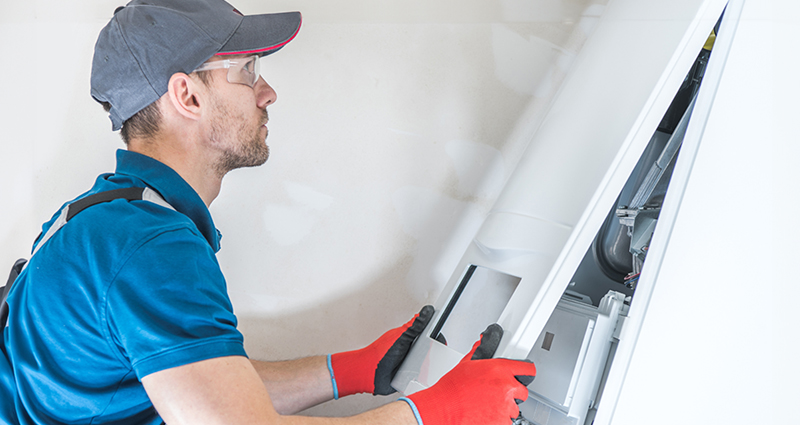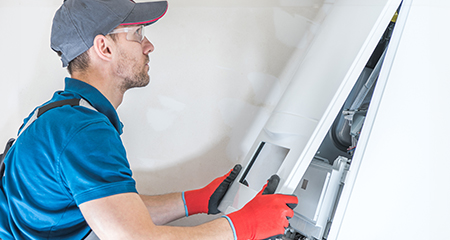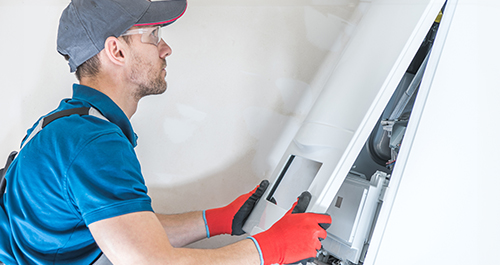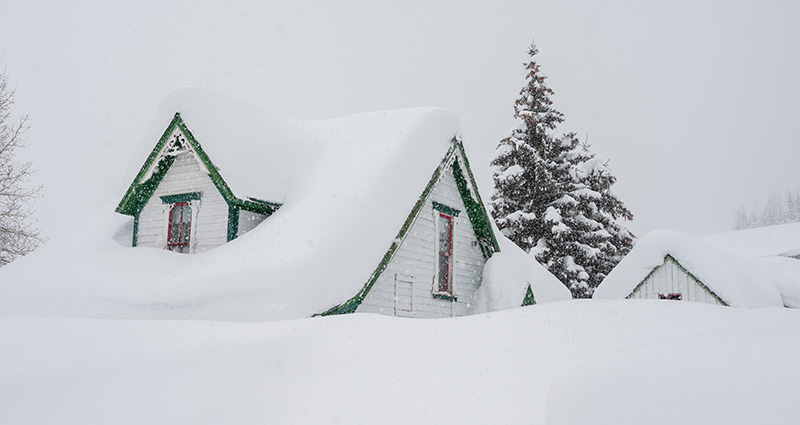Start your maintenance early
The coldest nights always seem to present the perfect opportunity for a spontaneous furnace failure. Prevent this with a proactive approach by conducting your furnace maintenance every year while the weather is still warm or mild. Getting the jump on your annual maintenance will give you plenty of lead time if you discover the need for repairs.
Administer the eye test
Before you start work on maintaining your furnace, give it a quick visual inspection. In gas furnaces, the venting pipe should be securely fastened and angled. Other tubes like drainage tubes that may also serve the air conditioning system should be securely fastened as well.
This is also a good time to smell around the system's gas line, which is usually a flexible tube. If an aroma of rotten eggs is detected, it means the furnace has a gas leak.
Clear the drainage tube
Natural gas and propane furnaces produce small amounts of water as they heat. Some of this is blown out as exhaust steam, but the rest drains from the power exhaust manifold to a drip pan that is often shared with the air conditioner. If the drainage tube clogs, water could fill the manifold and the flame sensor would shut the system down.
Keep the drainage tube clear by detaching it from the manifold and blowing compressed air through the tube and drainpipe. You can also pour a cup of white vinegar through the drainage tube and pipe to help prevent a filmy buildup.
Inspect the thermostat wires
Once the power has been shut off and the furnace doors removed, begin your furnace maintenance by giving the furnace wires a slight pull to ensure they are tight and properly fitted. You want to make sure that your thermostat is properly communicating the right temperature and not overworking your furnace.
Dust and vacuum
Dust, dirt and debris can cause a furnace to work sub-optimally or in some cases, not at all. To avoid this problem, use a soft-tipped paint brush applied gently against the inner components of the furnace to loosen dust and debris without damaging the furnace's interior. Once the brushing is complete, remove the material with a portable vacuum.
Clean the flame sensor
A dirty flame sensor in a gas furnace will stop the unit from working altogether, so clean this part at least once a year. Unscrew the sensor from the furnace and then while holding it at the bottom, clean the sensor with an emery cloth. Once the sensor is clean, it can be replaced and the door reinstalled.
Maintain your system however you get your heat
While most North American homes are heated with natural gas, propane or electric furnaces, there are several other types of systems: steam radiator heat, air or geothermal heat pumps, radiant heat, baseboard heaters and more. Some of these systems, like radiant floor heating, are virtually maintenance-free.
Others, like heat pumps, require annual tune-ups similar to air conditioners. If you have a heating system other than a gas or electric furnace and you're unsure about its maintenance requirements, contact the installer or your local HVAC professional for guidance.
Furnace filter maintenance
Changing your filter is the most important thing to do to ensure your furnace and air conditioner's longevity and performance, saving you up to 5 to 15% on your energy bill. One of the biggest culprits behind equipment issues are dirty filters, which can:
- Restrict airflow, which puts additional strain on the fan motor that, after time, can make your motor burn out, your system overheats, or your equipment fail.
- Forcing your fan motor to overwork, which uses more energy, can cause damage to your system and significantly raise your utility bill.
- Drastically reduces your indoor air quality, which can aggravate allergies, asthma and other illnesses.
- Clogging ductwork with debris can decrease your equipment's life span and lead to costly repair or replacement expenses.
The furnace's filter was likely replaced when it was last inspected, but it should be replaced every 1 to 3 months unless otherwise instructed by the manufacturer of the furnace. Homes with smokers or pets will likely need to change their filters more regularly than other households.
Set a date on the calendar after the cleaning to easily remember when the filter should be changed. Some homeowners also find it easier to simply replace the filter on the first day of every month.
In addition to the filter, you should keep the area around the furnace clean and free of obstructions, especially combustible materials. This allows the furnace to run properly and avoid potential damage to the unit, its performance or your home.
Consider a professional for any mechanical maintenance
Maintaining your home's furnace may be difficult if you don't have a mechanical background. If you feel uncomfortable handling any of these tasks, bring in a professional furnace maintenance technician.
Even in cases where you feel you can accomplish most maintenance steps alone; it's still a good idea to hire a professional to thoroughly inspect the system and ensure it's running properly.
A yearly preventative maintenance inspection by a qualified service technician can keep your HVAC functioning at peak efficiency by identifying problems from thermal stress, movement or dust.
Common problems that a technician can address include:
- Ductwork loosened due to normal thermal expansion and contraction
- Blower motor bearings in need of lubrication
- Replacing air filter and cleaning of dust from blower fan blades and AC condensing coil
An inspection can also find and repair less obvious problems like:
- Loose blower belt
- Improperly firing burners
- Blocked condensate drain
- Loose wiring harnesses
- Slowly leaking coolant from the AC system
The best way to keep your furnace efficient and reliable is to have it inspected before you need it. Before cold weather strikes, set up an appointment to have your heating system inspected by an expert.
Yearly fall maintenance can save you time, frustration, and money when it's done right by inspection that includes a comprehensive diagnostic check to ensure that your furnace is operating safely, efficiently and to the manufacturer's specifications.
Some manufacturer warranties even state that annual maintenance is required for proper warranty coverage and that any repairs required due to lack of routine maintenance are not covered by warranty.
How to find a reliable furnace technician
Selecting the right furnace service company is almost as important as the unit itself. If you've never hired a furnace professional, finding the right one can be difficult, so we've assembled the following questions to help with your search:
- Do I know anyone who has had their furnace serviced? Sometimes the smallest recommendation can go a long way. If a trusted friend or family member has had their furnace serviced, ask them who performed the repair and if the system worked well afterward. A satisfactory answer to this question may conclude the search immediately.
- What experience does the company have? When contacting service providers, it helps to learn more about their experience. You must make sure you find a veteran firm that has worked with your system before.
- Are the technicians licensed? Asking about licensure is an easy way to ensure you'll be dealing with skilled technicians who can deliver the best possible work. If the technicians aren't licensed, it's time to move on.
- What additional services does the company offer? It's important to hire a well-rounded company, so you should ask the prospective vendor if the company offers repair services, testing options and measures that will help prevent future breakdowns.
- What preventive maintenance measures can be tackled without a professional? The furnace repair company should be willing to lend its expertise and guide you in maintenance steps you can do on your own to support the maintenance of the furnace. These tips practiced regularly, will ultimately keep the unit in better condition, and that should be the goal of both parties.
- Are emergency services offered? If the worst occurs and the furnace must be immediately repaired or replaced, it's important to know the company can rise to the challenge. This is especially true if the system fails because of extreme cold, as families don't want to be subjected to the elements any longer than necessary.
- Does the company do background checks on its technicians? Don't make the mistake of assuming a furnace technician is trustworthy simply because the company hired them. Because not every company conducts background checks, you must ask if a background check has been done since you're allowing this technician into your home and around your family. The importance of these inherent safety concerns cannot be understated.






































